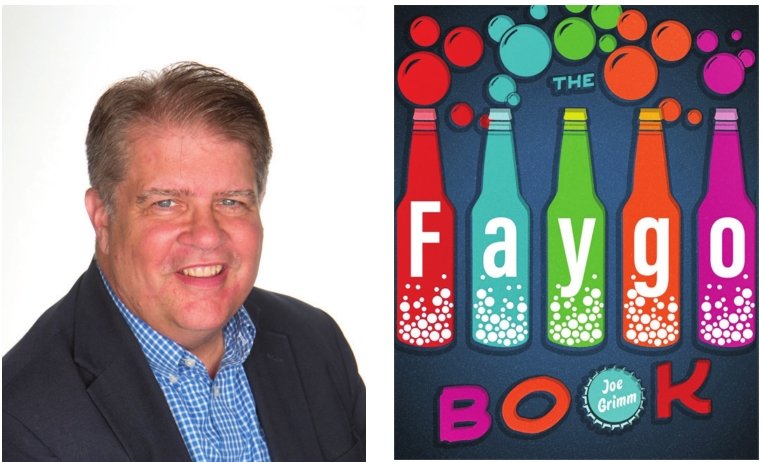
What do the Insane Clown Posse, Alex Karras, boxer Tommy Hearns, the Detroit Tigers and the Michigan State University Marching Band have in common? Faygo Red Pop, of course.
They all went for the iconic Detroit soda pop “Fayg-o-o-o!” In his new novel, “The Faygo Book,” Joe Grimm, MSU Journalism Professor and former Detroit Free Press reporter, ties these and other disparate characters together in a colorful 135-page history of one of Detroit’s legendary soda pops.
According to Grimm, “The book isn’t just a history of Faygo; it’s a social history of Detroit. Faygo is Detroit history,” he said.
“The Faygo Book” is also the incredible history of the Feigenson family. After their arrival in 1906, they began a pop-bottling works in Detroit, which sold eight ounce bottles of strawberry, fruit punch and grape flavored soda. Today, Grimm estimates the company bottles some 60 flavors, including one of its all-time favorites, “Red Pop.”
Originally named Feigenson Brothers Bottling Co., in 1920 the brothers, in an astute and practical branding move, changed the company and product’s name to simply “Faygo.”
According to Grimm, “the name fit better on small pop bottles.”
City Pulse caught up with Grimm by phone, as he was driving to a meeting with the Faygo marketing department, which in itself is an interesting story.
“’The Faygo Book’ is the book you get when you don’t get access,” he said. Although he tried several times to contact Faygo, which is no longer family owned, he was rebuffed.
Despite that Grimm likes the outcome. “This book is a story from people rather than the company. Social media helped tell the story. Faygo is all over eBay, Instagram and Flickr,” he said.
However, by serendipity, Grimm was able to make one revelatory connection with Susan Feigenson, the granddaughter of Philip Feigenson, a son of one of the original founders.
Grimm was able to make the family connection through the efforts of one his journalism students, whom he credits in the introduction. Coincidently, the student had Susan Feigenson as an English teacher in high school and was able to make the connection, opening up a treasure trove of family archives to Grimm.
In the book Grimm takes us through the rise and fall of Detroit through the eyes of Faygo, which seemed to be at the center of the vortex.
Unlike many other companies, when racial tension boiled over in the city, Faygo did not rush to move from its location on Gratiot Avenue on Detroit’s east side.
In a chapter called “Faygo Town” Grimm tells the inspirational story of the company, which has maintained its headquarters on Gratiot for more than 100 years. By the time of the 1967 riots, Faygo’s production workforce was 75 percent black.
“The Feinengolds were just decent people,” Grimm said. He speculates that may be why the headquarters on Gratiot escaped any damage during the riot.
Suzie Feinengold was working at the factory the summer of 1967 and recalls finding IOUs to workers sitting on her father’s desk.
The company’s actions oftentimes weren’t even in their best interests.
As an example, Grimm relates how during an “official” prolonged strike in 1980 one of the owners gave the order to break up some of the wooden pallets to provide firewood for the men on the picket line.
And if that’s not enough to warm up to Faygo pop, the company’s groundbreaking advertising will further soften you up.
Many will recall the 1956 television advertisement showing Faygo Kid saving a stagecoach of Faygo root beer from Black Bart. Jim Henson’s 1958-1959 pre-Muppet commercials seem primitive today.
In one, a Kermit-like Wilkins has just filled his swimming pool with strawberry Faygo when "Won'tkins" falls in and drowns. Wilkins retorts “I told him he’d end up drinking Faygo.”
Starting in 1965 as one of the TV sponsors for the Detroit Tigers, Faygo began airing the word-popping, catchy jingle known as the “Boat Song,” which is still on replay in most baby boomers’ heads.
It starts like this “Remember when you were a kid? Well part of you still is. And that’s why we make Faygo” and then jaunts off into some favorite childhood memories. The MSU Band routinely plays the song at football games, accompanied by swaying fans.
Faygo, like many other companies of the time, used local celebrities in ad campaigns, favoring Detroiters like Alex Karras, Tommy Hearns and Soupy Sales. Sales once said, “George Washington may be father of the U.S, but Faygo is its pop.”
But who could have expected that the rap group Insane Clown Posse would routinely use Faygo to spray their followers, called Juggalos, at concerts?
Lansing-ites may remember that in 2016, after being asked not to use Faygo in their act at the Loft, a local club, ICP sprayed their devoted Juggalos with Faygo anyway, leaving a sugary mess for promoters to clean up.
Which just goes to prove you can’t keep Faygo down, and meanwhile Grimm said “he’s on a diet” from all the research he did for the book.
“I still prefer Red Pop,” he said.
Support City Pulse - Donate Today!
Comments
No comments on this item Please log in to comment by clicking here